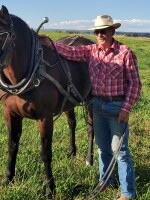Last week I reported about how farming practices have changed dramatically after the end of World War II with the introduction of chemical herbicides into farming practices. DuPont Company slogan “Better Living Through Chemistry” ushered in a new era for U.S. agriculture, which encouraged ever larger farms, bigger equipment and more purchased inputs, including new, improved seeds and crop chemicals. The search for new herbicides to combat weeds that have become resistant to existing crop chemicals has not been free of glitches. Dicamba is one of the newest wonder herbicides that has been effective for controlling weeds in soybeans and cotton that have become resistant to older herbicides. But dicamba has a problem. The darn stuff doesn’t stay where it’s applied. It volatilizes and often drifts for miles from where it was applied to fields growing produce, vineyards, fruit orchards and the surrounding environment. Last week, the U.S. District Court of Arizona rescinded approval of dicamba-based herbicides produced by chemical companies Bayer, Syngenta and BASF. And that’s creating supply concerns for farmers, who are preparing for this year’s planting season. In the ruling, Arizona District Court Judge David Bury stated that “when the EPA approved dicamba, the agency understated the risks to human health and the environment that comes with spraying the herbicide.” A U.S. appeals court had previously restricted sales of dicamba-based herbicides in June 2020, noting that the EPA had understated risk, and the Agency reinstated approval of the products four months later with new restrictions. But environmental groups contend that the changes weren’t enough to prevent drift damage. Now, many farmers are caught in the middle because they’ve already purchased dicamba resistant varieties of cotton and soybean seeds and dicamba-based herbicides for the upcoming growing season. At this stage, it’s uncertain how the situation will be resolved.
Watching congress deal with important legislation like the farm bill or immigration reform is kind of like watching a professional tag team wrestling match without a referee. Chairwoman of the Senate Ag Committee Debbie Stabenow of Michigan says that there’s still opportunity to get a farm bill done this year, but it’s only doable if people set their partisan hats aside. “Members need to sit down and work together on a bipartisan basis” she says. The Chairman of the House Agriculture Committee stated recently that “We absolutely can get this done. March is still a possibility for a new Farm Bill; however, there are no guarantees, because the markup and voting process takes at least three weeks.”
CSU Extension Montezuma County and Western Sustainable Agriculture Research & Education have teamed up to present the Livestock Workshop Series. All workshops are free, but pre-registration is requested. On Tuesday, February 20th, the Livestock Parturition workshop will be presented by Dr. Gerald Copenhaver from 5:30 to 8 pm at the Lewis Arriola Community Center. On February 23rd from 2 until 4 pm,. Dr Copenhaver will cover when to assist during livestock births or call the vet, supplies to have on hand and how to use them, and tips and tricks for the health of the dam and offspring. Beth LaShell, Old Fort Director at Fort Lewis College is presenting the Livestock Nutrition workshop at the Mt. Lookout Grange in Mancos. She will present digestive tracts and basic nutrients, providing nutrition to meet lifecycles and how to read feed labels. On Saturday March 2nd, Dr. Raye Walck, CSU Vet Diagnostic Lab will present a General Livestock Care workshop, which will cover how to find healthy animals and what is unhealthy, providing general preventive care and knowing what is normal, Establishing a relation with a veterinarian, making emergency and evacuation plans, and the basics of livestock behavior. Information about the workshops is at https://csuextensionmontezuma.evenbrite.com, or contact the Montezuma County Extension Office at 970-564-4170.
Henry Ford wrote, “Anyone who stops learning is old, whether at twenty or eighty. Anyone who keeps learning stays young.”



